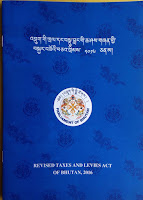Upon appointment as
Sales Tax Inspector under Regional Revenue and Customs Office, Thimphu with
effect from 1st July, 2008, I feel, I had the most of the
opportunities unlike some of my friends from the same training cohort. I was
young and full of energy and enthusiasm to learn and explore more each day. I
had the opportunity to lead a team to carry out sales tax assessment of sales
tax collecting agents (STCAs) under Thimphu region when most of the senior officers
were on study leave. Being single was yet another advantage and opportunity for
me as I could go on assessment where ever the office wants to send as I did not
had any family obligations unlike my other colleagues in the office.
Since I was appointed
under Sales Tax Section, unlike other colleagues, I had the opportunity to work
with other sections like Direct Tax Administration, Customs and Excise Section
and Revenue and Auditing Sections as well. It was mostly during any field
assessment or inspection where people refrain from going to and also most of
the colleagues were female. I had this opportunity to go out in the field like
tobacco and illicit liquor inspection with customs official, revenue auditing
of Punatshangchu Hydro Project with revenue and auditing team and business
income tax collection for lump sum basis with team from direct tax
administration.
During my last six
years in the department I have had the opportunity to attain numerous training
abroad and within the country specially to enhance the learnings of tax auditing.
I would also like to share that the first sales tax assessment/auditing of hotel Taj Tashi was assessed by my team in
the year 2010. With first-hand experience on varieties of diverse business
units in the country, I also had the opportunity to be a team of assessing one
of the FDI hospitality industry in Bhutan. The result from this assessment was
extra ordinary compared to other assessments carried out earlier as there was
huge findings of additional sales tax amounting in millions. The team was led
by my section head Mr. Sherab Chogyal (Assisstant Collecter then) from whom I
learned many skills required to carry out auditing in complex high end
hospitality business units.
It was then the
recognition of “Certificate of Merit” from the department was awarded by the
Regional Director to the team on 16th December 2011 for exemplary tax
assessment carried out without fear and being bias.











